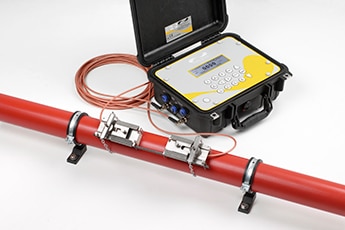Flow Sensors

Flow sensors are indispensable in various industrial and commercial settings, ensuring efficient fluid management systems. From HVAC to water treatment, these sensors monitor the movement of liquids and gases within pipelines and equipment, allowing industries to optimize operations, prevent leaks, and improve overall system efficiency.
At the forefront of flow measurement solutions is Micronics, known for its innovative range of sensors, including differential pressure sensors. These products address industry challenges like pressure drops and fluid flow variability. Trusted across multiple sectors—such as water management, HVAC, and process industries—Micronics’ solutions enhance resource efficiency and operational reliability.
What is a Flow Sensor?
A flow sensor is a device used to detect and measure the rate of fluid movement through a particular point in a system, whether liquid or gas. These devices are critical in industries where accurate fluid flow monitoring is essential for regulating processes and improving operations, including water treatment, chemical processing, and manufacturing.
Flow sensors not only measure flow rates but also help optimise resources. By providing real-time data on fluid movement, businesses can streamline their operations, reduce waste, and enhance energy efficiency. The importance of flow sensors extends beyond industrial sectors and is increasingly seen in residential areas for water management and leak detection.
How Do Flow Sensors Work?
The working principle of a flow sensor varies depending on the type, but most operate by detecting changes in parameters like velocity, pressure, or displacement as the fluid moves through a sensor installed inside a pipeline or duct. The sensor collects data, which is converted into a readable form such as flow rate. This information can be displayed on a monitor or transmitted to control systems for automated adjustments.
Many flow sensors rely on the relationship between fluid pressure and flow rate. As fluid velocity increases, pressure builds up. This relationship is key for differential pressure sensors, which are among the most widely used in industries. By measuring the pressure difference between two points, these sensors provide accurate flow rate calculations.
What are the types of Flow Sensor?
There are several types of flow sensors, each employing different principles to measure fluid flow. Some common types include:
- Differential Pressure (DP): Measure pressure difference caused by flow.
- Velocity: Measure flow speed using ultrasound (transit-time or Doppler), turbine, paddlewheel, or vortex shedding.
- Positive Displacement: Count fixed fluid volumes passing through.
- Mass: Measure mass flow rate using Coriolis effect or heat transfer (thermal mass).
- Open Channel: Measure flow in open channels like rivers.
What is a flow sensor for water?
A flow sensors for water is a type of flow sensor specifically designed to measure water flow rates. These sensors are commonly used in plumbing systems, irrigation networks, water treatment plants, and various industrial processes. They are available in different sizes and configurations to suit various pipe diameters and flow requirements. Flow sensors for water play a crucial role in efficient water use, leak detection, and overall system performance optimisation.
Is a Flow Sensor the same as a Flow Meter?
Although the terms flow sensor and flow meter are often used interchangeably, they refer to slightly different components in a flow measurement system. A flow sensor detects and measures fluid flow, providing raw data on flow rates. On the other hand, a flow meter includes a sensor but also incorporates additional components like a display or transmitter, which allow users to view and interpret the flow data in a more user-friendly manner.
In essence, a flow meter offers more comprehensive functionality by combining flow detection with data presentation. A flow sensor can be considered one part of a complete flow meter system but lacks the broader capabilities of the meter without the accompanying features.
Other FAQ’s
What is the difference between a flow sensor and a water meter?
A flow sensor is a device that detects and measures the flow of fluids and provides data about the flow rate. In contrast, a water meter specifically measures the volume of water used in residential, commercial, or industrial settings and usually includes a flow sensor as part of its assembly. The primary function of a water meter is for billing and conservation efforts.
What are the most common flow sensors?
The most common flow sensors include differential pressure flow sensors, turbine flow sensors, and ultrasonic flow sensors. Each type is selected based on the specific requirements of the application, such as the nature of the fluid, flow rate, and environmental conditions.
Check Out Our Other Pages
Explore more of our diverse range of products and services:
- Water Flow Meters – Discover our variety of water flow meters suitable for multiple applications.
- General Water Flow Meter Info – Learn more about our solutions in water flow metering.
- Flow Switches – Explore our flow switches for water and environmental applications.
- Ultrasonic Flow Meters – Learn about our advanced ultrasonic flow meters.
- Ultrasonic Liquid Flow Meters – Find high-precision liquid flow measurement solutions.
- Flow Sensors – View our robust and efficient flow sensors.
- Flow Meter Services – Get professional services for your flow meter needs.
- Types of Flow Meters – Educate yourself on different types of flow meters available.
- Inline Flow Meters – Check out our inline flow meters for precise measurements.
- Level Meters – Explore our level meters for water and environmental monitoring.
- Portable Flow Meters – Discover portable solutions for on-the-go flow measurement.